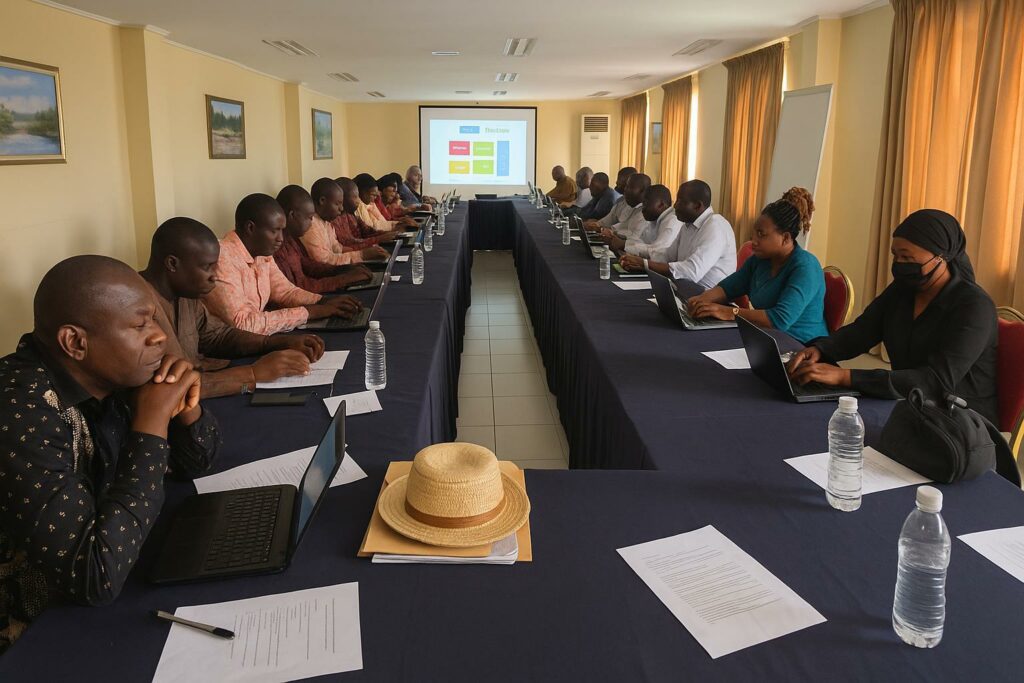Central African Indigenous Land Rights Under the Spotlight
For three intense days, from 29 to 31 October, the Congolese capital became the epicentre of a debate that has long simmered beneath the equatorial canopy. The Regional Network of Indigenous Peoples of Central Africa (Repaleac) convened experts, civil-society leaders and state observers to grapple with the most sensitive of resources: land. Participants converged in a hybrid format, combining face-to-face exchanges with remote interventions, to crystallise a Community of Practice devoted to customary land and forest rights. While the venue was Brazzaville, the stakes encompassed the entire Congo Basin, a region where community tenure systems pre-date colonial borders yet remain precarious in modern statutory regimes.
Community of Practice Launch in Brazzaville
The inaugural session endorsed the creation of the francophone Community of Practice (CoP) on land and forest tenure. Delegations from Cameroon, the Central African Republic, Gabon and Rwanda joined Congolese counterparts in validating a pragmatic work plan, including the designation of two pilot countries whose identities are to be finalised before year’s end. According to organisers, the CoP is conceived as a living platform for mutual learning, peer-to-peer technical assistance and the dissemination of legal tools capable of translating constitutional promises into enforceable rights.
Catherine Fleur Amban Nkoro, an advocate for Baka communities in Cameroon, emphasised the urgency. “Indigenous peoples confront land problems, especially in their dealings with our governments. We have called upon the FAO, responsible for land issues in their favour, to reinforce this point,” she stated, underlining a broader sentiment shared across delegations that formal recognition must be matched with operational mechanisms capable of resisting encroachment.
FAO Support and Kunming-Montreal Alignment
The Food and Agriculture Organization of the United Nations co-organised the workshop, providing technical guidance consistent with its tenure governance mandate. The timing is significant. One year after the Kunming-Montreal Global Biodiversity Framework enshrined indigenous stewardship as a cornerstone of planetary conservation, Brazzaville’s gathering illustrated how international commitments can be localised. Repaleac’s strategic axis on secure and equitable land governance dovetails with the Framework’s Target 22, which calls for the equitable participation of indigenous peoples in decision-making.
By situating the CoP within this multilateral architecture, participants acknowledged that land security is not solely a cultural or social imperative but also a prerequisite for the climate resilience of the Congo Basin, often regarded as the world’s second-largest tropical forest complex. The workshop therefore framed customary tenure not as an obstacle to development but as a lever for sustainable growth, capable of attracting climate finance predicated on robust social safeguards.
Governance, Resilience and Equitable Development
Discussions highlighted three strands of expected impact. First, inclusive land governance: delegates argued that clarifying tenure would reduce disputes, ease administrative burdens and improve communities’ access to justice. Second, climate resilience: secure rights were portrayed as incentives for long-term stewardship, thereby enhancing forest carbon stocks and biodiversity integrity. Third, equitable development: by anchoring livelihoods in legally recognised territory, local groups can engage in formal value chains on more favourable terms.
The legal lens was omnipresent. Jurists present in the room cautioned that many Central African land laws still deliver recognition through discretionary decrees rather than automatic registration, exposing communities to elite capture. The forthcoming pilot projects are therefore expected to test streamlined procedures—land certificates, participatory mapping, and alternative dispute-resolution forums—that could later inform statutory reforms at national level.
Next Steps: Pilot Countries and Regional Synergies
The roadmap adopted in Brazzaville foresees a light yet agile governance structure, with an online knowledge hub, quarterly webinars and annual in-person reviews. A technical secretariat shared by Repaleac and the FAO will oversee the compilation of case studies and the mobilisation of external expertise. Participants agreed to begin by concentrating resources on two countries where political will and civil-society capacity align; preliminary conversations pointed to Cameroon and Gabon, though the final decision awaits formal endorsement.
From a broader perspective, the workshop underscored Congo-Brazzaville’s convening power in the sub-region. By hosting the launch, Brazzaville reaffirmed its commitment to multilateral environmental diplomacy, a stance consistent with its National Development Plan that prioritises environmental governance and social cohesion. Stakeholders left the capital with a tempered optimism: the path to secure customary tenure is complex, but the institutional scaffolding now exists to support steady, evidence-based progress across Central Africa.
Key Takeaways for Policymakers and Investors
Observers noted two immediate lessons. First, inter-agency collaboration—linking indigenous networks, government agencies and UN bodies—can fast-track practical solutions when anchored in a shared platform. Second, embedding land-tenure work within global frameworks such as Kunming-Montreal gives regional initiatives additional leverage when seeking climate finance or bilateral partnerships.
While the launch marks only the first step, the Brazzaville summit has transformed a long-standing advocacy theme into a structured programmatic agenda. If the upcoming pilot phase delivers concrete gains, the CoP could evolve into a permanent technical mechanism informing national land policies, thereby ensuring that the ancestral custodians of Central Africa’s forests are granted the legal certainty they have sought for decades.

